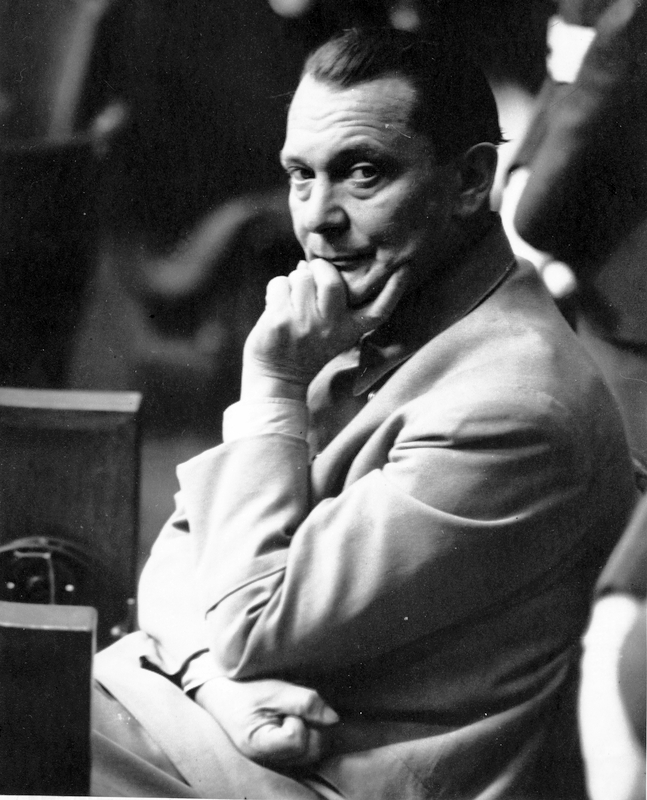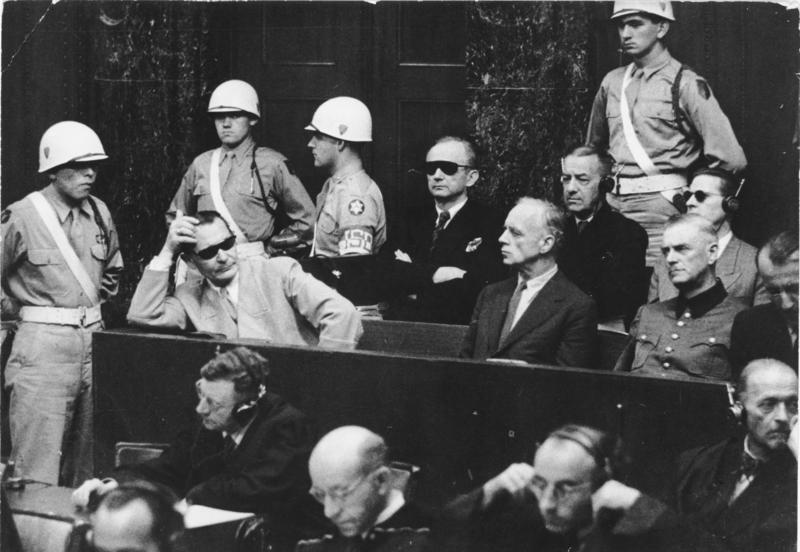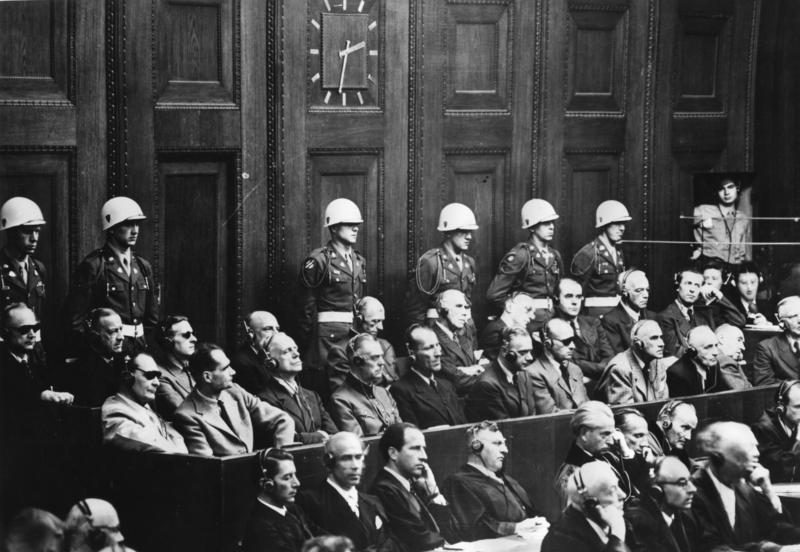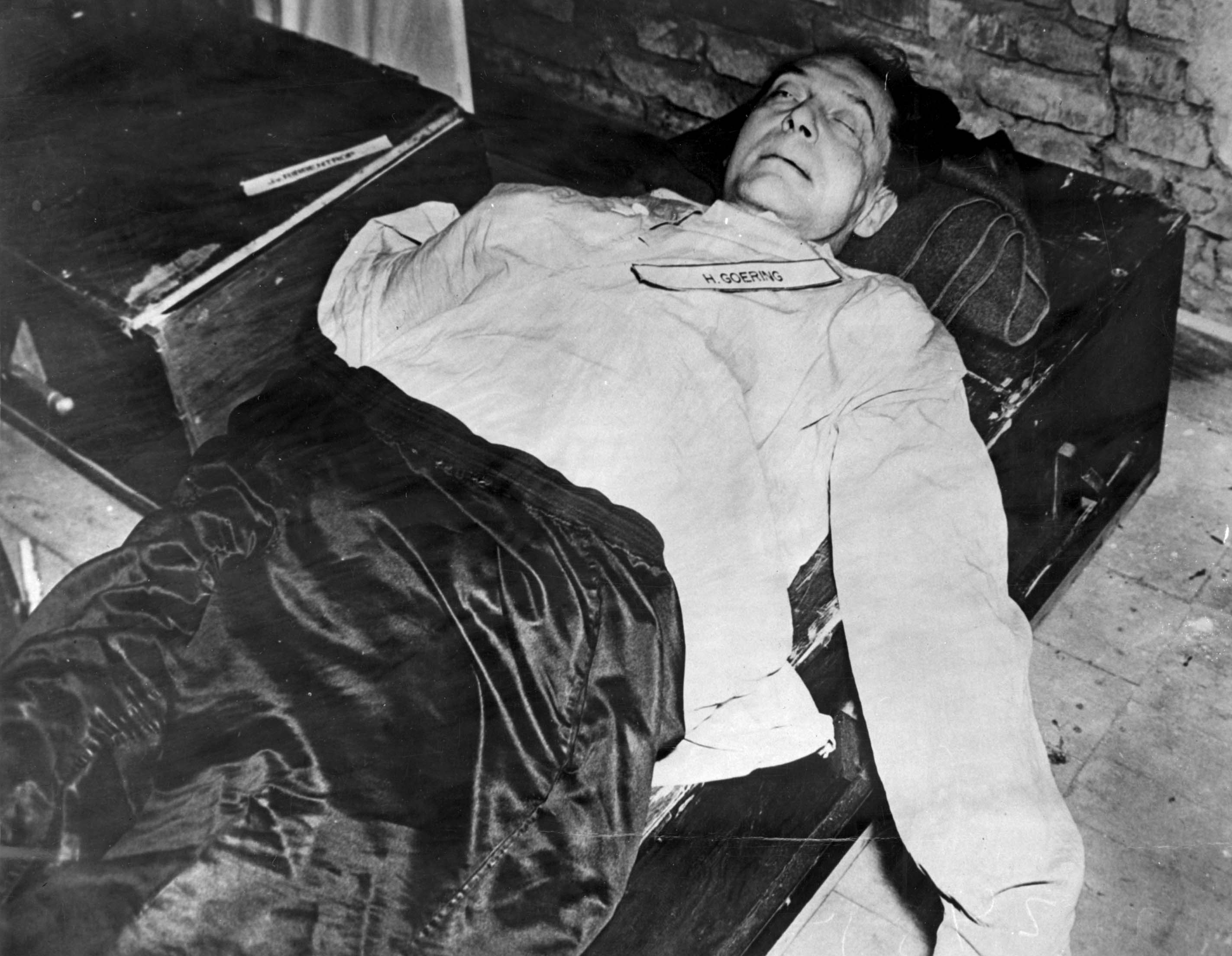.

German Reichsmarschall, Commander of the Luftwaffe Hermann Göring (1893-1946) during cross examination at his trial for war crimes in Room 600 at the Palace of Justice during the International Military Tribunal (IMT), Nuremberg, Germany, March 1946: photo by Raymond D'Addario, 3264th Signal Photo Service Company, US Army (National Archives, courtesy of USHMM Photo Archives)
And though one had read surprising news of Göring for years, he still surprised. He was so very soft. Sometimes he wore a German Air Force uniform, and sometimes a light beach suit in the worst of playful taste, and both hung loosely on him, giving him an air of pregnancy. He had thick brown young hair, the coarse bright skin of an actor who has used grease paint for decades, and the preternaturally deep wrinkles of the drug addict. It added up to something like the head of a ventriloquist’s dummy. He looked infinitely corrupt, and acted naively. When the other defendants’ lawyers came to the door to receive instructions, he often intervened and insisted on instructing them himself, in spite of the evident fury of the defendants, which, indeed, must have been poignant, since most of them might well have felt that, had it not been for him, they never would have had to employ these lawyers at all. One of these lawyers was a tiny little man of very Jewish appearance, and when he stood in front of the dock, his head hardly reaching to the top of it, and flapped his gown in annoyance because Göring’s smiling wooden mask was bearing down between him and his client, it was as if a ventriloquist had staged a quarrel between two dummies.
Defendants in the dock, Nuremberg trials, 1945-1946: front row, left to right, Hermann Göring, Rudolf Hess, Joachim von Ribbentrop, Wilhelm Keitel; in second row, left to right, Karl Dönitz, Erich Raeder, Baldur von Schirach, Fritz Sauckel: photo by Office of the U.S. Chief of Counsel for the Prosecution of Axis Criminality/Still Picture Records LICON, Special Media Archives Services Division (NWCS-S) (National Archives and Records Administration)
Göring’s appearance made a strong but obscure allusion to sex. It is a matter of history that his love affairs with women played a decisive part in the development of the Nazi party at various stages, but he looked as one who would never lift a hand against a woman save in something much more peculiar than kindness. He did not look like any recognized type of homosexual, yet he was feminine. Sometimes, particularly when his humour was good, he recalled the madam of a brothel. His like are to be seen in the late morning in doorways along the steep streets of Marseille, the professional mask of geniality still hard on their faces though they stand relaxed in leisure, their fat cats rubbing against their spread skirts. Certainly there had been a concentration on appetite, and on elaborate schemes for gratifying it; and yet there was a sense of desert thirst. No matter what aqueducts he had built to bring water to his encampment, some perversity in the architecture had let it run out and spill on the sands long before it reached him. Sometimes even now his wide lips smacked together as if he were a well-fed man who had heard no news as yet that his meals were to stop. He was the only one of all these defendants who, if he had the chance, would have walked out of the Palace of Justice and taken over Germany again, and turned it into the stage for the enactment of the private fantasy which had brought him to the dock.
Defendant Hermann Göring in the prisoners' dock at the International Military Tribunal trial of war criminals at Nuremberg, 20 November 1945-1 October, 1946: photographer unknown (Harry S. Truman Library, courtesy of USHMM Photo Archives)
The next day, the last day of the trial, there was something like hatred to be seen on the faces of many Germans of the street. The Palace of Justice was even fuller than before, the confusion engendered in the corridors by the inefficient scrutiny system was still more turbulent. There were some bad officials at Nuremberg, and that day they got completely out of hand. One of them, an American, male and a colonel, had always been remarkable for having the drooping bosom and resentful expression of a nursing mother who has had a difficult parturition, and for having throughout the trial nagged at the correspondents as if they were the staff of the maternity ward that had failed him. The defendants were, however, quiet and cool. They were feeling the relief that many of us had known in little, when we had waited all through an evening for an air raid and at last heard the sirens, and, ironically, they even looked better in health. In the morning session they learned which of them the court considered guilty and which innocent, and why; and they listened to the verdicts with features decently blank except when they laughed. And, miraculously enough, they found the standing joke of the judges' mispronunciation of German names just as funny today as before; and the acquittals amused them no end. Three of the defendants were found not guilty.
View of the defendants in the dock at the International Military Tribunal trial of war criminals at Nuremberg: photographer unknown, November 1945 (National Archives, courtesy of USHMM Photo Archives)
Something had happened to the architecture of the court which might happen in a dream. It had always appeared that the panelled wall behind the dock was solid. But one of the panels was really a door. It opened, and the defendants came out one by one to stand between two guards and hear what they had earned. Göring, in his loose suit, which through the months had grown looser and looser, came through that door and looked surprised, like a man in pajamas who opens a door our of his hotel room in the belief that it leads to his bathroom and finds that he has walked out into a public room. Earphones were handed him by the guard and he put them on, but at once made a gesture to show that they were not carrying the sound. They had had to put on a longer flex to reach from the ground to the ear of a standing man, and the adjustment had been faulty. His guards knelt down and worked on them. On the faces of all the judges was written the thought, "Yes, this is a nightmare. This failure of the earphones proves it," and it was written on his face too. But he bent down and spoke to them and helped with the repair. This man of fifty-three could see the fine wires without spectacles. When the earphones were repaired he put them on with a steady hand and learned that this was not a nightmare, he was not dreaming. He took them off with something like a kingly gesture and went out, renouncing the multitudinous words and gestures that must have occurred to him at this moment. He was an inventive man and could not have had to look far for a comment which, poetic, patriotic, sardonic, or obscene, would certainly have held the ear of the court and sounded in history; and he was a man without taste. Yet at this moment he had taste enough to know that the idea of his death was more impressive than any of his ideas.
Hermann Göring (in dark glasses, leaning on the dock), at the Nuremberg trials, 1945: photographer unknown (Deutsches Bundesarchiv)
A great mercy was conferred upon him. At this last moment that he would be seen by his fellow men it was not evident that he was among the most evil of human beings that have ever been born. He simply appeared as a man bravely sustaining the burden of fear. This mercy was extended to all the prisoners. It must be recorded that there was not a coward among them. Even Ribbentrop, who was white as a stone because of his terror, showed a hard dignity, and Kaltenbrunner, who looked like a vicious horse and gave no promise of restraint, bowed quietly to the bench. Frank, the governor of Poland, who had repented and become a good Catholic and wore black glasses more constantly than any of the others, gave an odd proof of his complete perturbation. He lost his sense of direction and stood with his back to the bench until he was spun round by the guards. But then he listened courageously enough to his sentence of death.
Defendants in the dock at the Nuremberg trials, 1945; center row, from left, Hermann Göring, Rudolf Hess, Joachim von Ribbentrop, Wilhem Keitel, Ernst Kaltenbrunner: photographer unknown (Deutsches Bundesarchiv)
There was a deep unity in their behaviour as there was a unity in their appearance. The only diversion was the mad little slap Hess gave the guards when they tried to hand him his earphones. He would not wear them, so he did not hear his sentence.
Hermann Göring and Rudolf Hess at the Nuremberg trials: from Nazis Face War Crime Evidence (newsreel), 6 December 1945: animated image by Alex D, 2007
Morning broke over Czechoslovakia, and there was day, and then there was night; but the clock had stopped. The people of Prague knew it and, though free and walking where they chose in their own city, were of like minds with their enemies, the prisoners of Nuremberg, concerning time. They wished it for ever suspended, knowing that when the hands of the clock moved again their doom would fall on them.
All Prague was in fear of the Russians, as all Berlin was in fear of the Russians. The blankness of a new page of history was being inscribed with a black text; and even those who had come to Prague to escape from the Nuremberg trial rarely thought of it. Though sometimes it came back.
There was at that time in Prague a British Film Festival which the liberals and Social Democrats were attending as a demonstration of their faith. This was a sign of their extreme desolation. They did not love Great Britain, for it had betrayed them at Munich. But at least Britain was not the USSR. So they stared loyally at the screen, even though what they saw was Mr. Noel Coward's Brief Encounter, a masterpiece which made little appeal to their sympathies. Sexual renunciation on secular grounds is not a theme which Central Europe understands; and the Czechs are forthright and matter-of-fact even for that territory. They looked at the doctors and the suburban housewife and supposed that they would sleep together if their desire to do so was sufficiently strong, and that they would not sleep together if their desire to do so was sufficiently weak. This reduced the element of conflict in the story to negligible proportions. They also asked themselves with some emotion whether it could really be true that in England there could be no other places than railway buffets where lovers could meet.
Celia Johnson and Trevor Howard in Brief Encounter, directed by David Lean, 1945: screen capture by Jihg, 2005
The drab and inhibited little drama seemed to unfold very slowly before this audience, which plainly felt that if such cases of abstinence occurred in a distant country there was no reason why it should have to know about them; and there was drowsiness in the air when an American spoke out of the darkness. A minor character had crossed the screen and at the sight this voice was saying in horror, "My God, that man looks just like Göring." It was one of the American lawyers from Nuremberg, who had fallen asleep and had awakened to see the screen as a palimpsest with the great tragedy imposed upon the small. The trial had begun in retreat into the past. Soon none of us, we thought, would ever think of it, save when we dreamed of it or read about it in books.
Yet we were soon to think often and gravely of Nuremberg and its prisoners.
Main section of prisoners' call block in the Nuremberg jail, cells occupied by Göring and Hess are at extreme right; each defendant is watched by an individual guard who is constantly posted at his door: photographer unknown, 24 November, 1945 (US Army)The executions were to take place on October 16. Some time during the preceding night Göring killed himself. The enormous clown, the sexual quiddity with the smile which was perhaps too wooden for mockery and perhaps not, had kicked the tray out of the hands of the servants who were bringing him the wine of humiliation, the glasses had flown into the air and splintered with a sound too much like laughter. This should not have happened. We are all hunters, but we know ourselves hunted by a mightier hunter, and our hearts are with the hunted, and we rejoice when the snared get free of the snare. In this moment visceral mournfulness changed to visceral cheerfulness; we had to applaud for the flesh that would not accept the doom that had been dealt to it but changed it to an expression of defiance. All those people who had fled from Nuremberg, British and American and French, who were scattered over the world, trying to forget the place of their immurement, would straighten up from whatever they had been bent over and burst out laughing before they could help themselves, saying, “That one! We always knew he would get the better of us yet.” Surely all those Germans who walked through the rubble of their cities while their conquerors drove, they too would halt, and throw back their heads, and laugh, and say, “That one! We always knew he would get the better of them yet.”
Hermann Göring during cross-examination, Nuremberg trials, March 1946: photographer unknown (USHMM Photo Archives, courtesy of National Archives and Records Administration)
Göring should not have been permitted even this small amelioration of his doom. True, we now know some reasons for feeling that he might have been allowed to get a little of his own back. Like all the Nazis, he had been plagued by the attentions of the psychiatrists who haunted Nuremberg Jail, exercising a triple function of priest and doctor and warder hard to approve. They visited the men in the cells and offered themselves as confidants, but performed duties at the behest of the court authorities. When some of the defendants seemed to be taking an unrepentant pro-Nazi stand in their line of defence, one of the psychiatrists worked out, at the commandant’s request, a plan for a new seating arrangement at the lunch table in order to break up this group and expose them to other influences. It is not easy to think of an accused person on trial before a national tribunal being subjected to such manipulation by prison officials. There was no silver lining to this cloud. One of these psychiatrists has related, without humorous intention, that when Göring asked him what a certain psychological test had revealed about his character, he replied that it had shown that he lacked the guts to face responsibility. Göring had also the benefit of spiritual care of a remarkably robust kind. He asked the Lutheran chaplain to give him Holy Communion on the night before the executions, but the chaplain refused, on the ground that he was probably shamming.
Defendant Hermann Goering consults with his lawyer, Dr. Otto Stahmer, in the Nuremberg prison at the International Military Tribunal trial of war criminals, Nuremberg: photo by Raymond D'Addario, 3264th Signal Photo Service Company, US Army (National Archives, courtesy of USHMM Photo Archives)
Nevertheless Göring should not have been given the chance to use his courage to weaken public horror at his crimes, to which his courage was not relevant. The Nazis were maniacs who plastered history with the cruelty which is a waste product of man’s moral nature, as maniacs on a smaller scale plaster their bodies and their clothes with their excreta. Since sanity is to some extent a matter of choice, a surrender to certain stimuli and a rejection of others, the nature of mania should never be forgotten. It is unfair, not only to Germans, but to all the world, if the vileness of the Nazis be extenuated; and it was unfair that this Nazi of all Nazis should have been allowed to disguise his gross dementia. This suicide meant a long-term danger to human standards, and it might have meant a short-term danger too, had it not been for the severity of the following winter. Germany was to be ice-bound and water-logged and had no time to think of reviving the Nazi party; and if that stretch of bad weather broke Europe’s heart, it also broke the continuity of popular political thinking and forced it on to a fresh phase not shadowed by resentment at conquest. But the Allies had failed idiotically in a prime matter. All to no purpose had the military policeman in the CIP gallery shaken the venerable Lord of Appeal and bidden him wake up and uncross his legs. All to no purpose had his colleague waved his club round the ears of the judge and asked him how the hell he had got in. All to no purpose had the maternal colonel shadowed our passes with his pendulous bosom. The cyanide had freely flowed.














12 comments:
"Weren't they ALL found guilty and DIG IT sentenced to serve like 3 months! in prison? I was only 5 years old
then so, I forget the details."
Jeez, Ed, you know what they say about the consequences of "historical innocence".
In fact, in the first session (1945-1946) of the Nuremberg vengeance shows -- er, war crime trials -- twenty four Nazis were indicted.
Three were acquitted, as Rebecca West says.
Twelve were sentenced to death by hanging.
Two -- Göring, Borman -- beat the reaper to the punch by committing suicide.
The Göring story went as West has it.
Following the grand sagesse of the US Army, those who were hung were hung by "short drop" ropes -- the old, cruel way, causing the condemned to die slowly, by strangulation.
If there is or was any mercy to be found anywhere in this picture, on the part of the defendants, the judges, or for that matter Rebecca West -- I'm missing it.
History remains a mystery.
(Wake me when they put the bank presidents on the stand.)
Rebecca West is wonderfully
insightfull but what did the real
Elmo say about all this. Elmo was
at Bell labs during WWII working
on fire control radar and then
afterwards the transister was
developed...a great leap forward
for human communication.
Elmo sitting his study by the fire
place surrounded by old copies
of Scientific American, Commonwheal, the National Review,
the notebooks of Leonardo DaVinci
and several Catholic texts said:
At one point a police force could
have stopped Hitler, and then a
national guard unit, and then an
army and then several armies and
a few nations and it ended up finally taking the whole world.
Thomas Mann said about the rubble
German was being turned into that
as sad as it was, it was better than the alternative.
The Americans really did not
understand Nazism or bon vivant
art collecting Goring. Rebecca
West did and their victims did.
Did Eisenhower? He ordered that
films of the liberated concentration camps be made because
he thought no one would believe
that such a thing could happen. The
why is still elusive. And the paucity of response among the educated still exists in this sense: Kalid Sheik Mohammed is the
bon vivant of alquaeda...with his
penchant of cooking and eating rare
birds...The rough text known as
the Old Testament had a little line
in it "If someone comes to kill you
kill him first"....hardly an
intellectual concept.
However it is the Christmas season
and I was listening to Bruce Springsteen talk about how the movie the Grapes of Wrath had influenced him...and about a scene of
beauty of a dance before a tragic
death and then Bruce said " where there
is beauty there is hope"...and then
I thought of Michangelo's statue
in the Vatican with a young Mary
holding a crucified Jesus and how
the tour guide remarked that school girls
questioned why she was so young.
Where there is beauty there is hope. As for the Nazis remember
this, to quote an old friend and
poet, just as burning and made in
May as West: Jesus was the first
universal Jew who gave all the
Gentiles a great deal. Merry
Christmas there's beauty on TC's
blog and therefore hope
Elmo the Eloquent, I salute and thank you for that.
Ed the Suddenly Shrinking Violet, I thought your numerous comments about Burt Lancaster, Spencer Tracy, Pearl Harbor, Oprah, Buster Brown, early enthusiasms and musical instruments, etc., etc., were innocuous and friendly fun and so was a bit mystified when your end of the conversation vanished behind a cloud of self censorship, shy as a new moon.
Tom, this is so beautifully presented that the horror it relates is almost unbearable.
"Sometimes, particularly when his humour was good, he recalled the madam of a brothel."
"Since sanity is to some extent a matter of choice"
The color photos and the motion picture insert make this so incredibly real.
Thanks very much, Curtis.
The West essay is charged with tension. She is a great writer with a vast and central historical subject. She is overcome by anger, exhaustion, moral outrage. She despises the Nazis, yet finds the Soviets, if possible, even more dreadful and revolting. She resents the ridiculous Americans. And of course the "good" side in this war is not easy to identify, as she seems to recognize. That the accused are guilty is a certainty to her. That the "trial" is largely a fraud, of course, meanwhile hardly escapes her hawklike notice.
At times the crackling tension in the air of the historical event pervades the prose with a seriousness that lifts it up to something like the level of Marvell's greatest of all political poems, his Horatian Ode, in which the assassinated king emerges with a perhaps unintended dignity. Such are the complications of appealing to Justice and Power and Right, those amorphous, possibly nonexistent agencies and entities.
"When the earphones were repaired he put them on with a steady hand and learned that this was not a nightmare, he was not dreaming. He took them off with something like a kingly gesture and went out, renouncing the multitudinous words and gestures that must have occurred to him at this moment."
Post a Comment